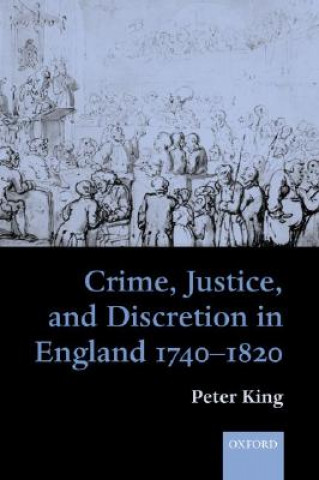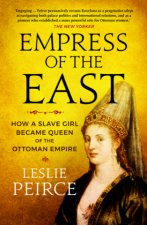
Kód: 04523527
Crime, Justice, and Discretion in England 1740-1820
Autor Peter King
The criminal law has often been seen as central to the rule of the 18th century landed elite in England. This book presents a detailed analysis of the judicial process - of victim's reactions, pretrial practices, policing, magistr ... celý popis
- Jazyk:
 Angličtina
Angličtina - Väzba: Pevná
- Počet strán: 398
Nakladateľ: Oxford University Press, 2000
- Viac informácií o knihe

Mohlo by sa vám tiež páčiť
-

Deadpool Max: Involuntary Armageddon
28.55 € -

Many Faces of RNA
201.01 € -

Individuarian Observations
22.79 €
Darčekový poukaz: Radosť zaručená
- Darujte poukaz v ľubovoľnej hodnote, a my sa postaráme o zvyšok.
- Poukaz sa vzťahuje na všetky produkty v našej ponuke.
- Elektronický poukaz si vytlačíte z e-mailu a môžete ho ihneď darovať.
- Platnosť poukazu je 12 mesiacov od dátumu vystavenia.
Viac informácií o knihe Crime, Justice, and Discretion in England 1740-1820
Nákupom získate 715 bodov
 Anotácia knihy
Anotácia knihy
The criminal law has often been seen as central to the rule of the 18th century landed elite in England. This book presents a detailed analysis of the judicial process - of victim's reactions, pretrial practices, policing, magistrates hearings, trials, sentencing, pardoning and punishment - using property offenders as its main focus. The period 1740-1820, the final era before the coming of the new police and the repeal of the capital code, emerges as the great age of discretionary justice, and the book explores the impact of the vast discretionary powers held by many social groups. It reassesses both the relationship betweeen crime rates and economic deprivation, and the many ways that vulnerability to prosecution varied widely across the lifecycle, in the light of the highly selective nature of pretrial negotiations. More centrally, by asking at every stage who used the law, for what purposes, in whose interests and with what effects, it opens up a number of new perspectives on the role of the law in eighteenth century social relations. The law emerges as the less the instrument of particular elite groups and more as an arena of struggle, of negotiation and of compromise. Its rituals were less controllable and its merciful moments less manageable and less exclusively available to the gentry elite than has been previously suggested. Justice was vulnerable to power but was also mobilised to constrain it. Despite the key functions that the propertied fulfilled, courtroom crowds, the counter-theatre of the condemned and the decisions of the victims from a very wide range of backgrounds had a role to play, and the criteria on which decisions were based were shaped as much by the broad and more humane discourse which Fielding called the "good mind" as by the instrumental needs of the propertied elites.
 Parametre knihy
Parametre knihy
Zaradenie knihy Knihy po anglicky Humanities History Regional & national history
290.17 €
- Celý názov: Crime, Justice, and Discretion in England 1740-1820
- Autor: Peter King
- Jazyk:
 Angličtina
Angličtina - Väzba: Pevná
- Počet strán: 398
- EAN: 9780198229100
- ISBN: 0198229100
- ID: 04523527
- Nakladateľ: Oxford University Press
- Hmotnosť: 727 g
- Rozmery: 243 × 163 × 26 mm
- Dátum vydania: 28. September 2000
Obľúbené z iného súdka
-

Empress of the East
13.55 € -28 % -

Rise And Fall Of The Third Reich
21.97 € -23 % -

History of Nepal
29.47 € -18 % -

Secret History
12.11 € -31 % -

Medieval Monsters
10.47 € -28 % -

Memoirs from the House of the Dead
10.57 € -

Families Who Made Rome
17.55 € -28 % -

Beyond Band of Brothers
15.50 € -28 % -

Angela's Ashes
11.49 € -28 % -

Washington
19.40 € -20 % -

Strange Death of Europe
22.49 € -9 % -

Great Siege, Malta 1565
17.97 € -16 % -

Imperial Japanese Naval Aviator 1937-45
24.75 € -

Witnesses to a World Crisis
109.80 € -

Sherman Firefly vs Tiger
16.53 € -28 % -

Great Britain's Great War
13.14 € -18 % -

Rolling Thunder Against the Rising Sun
30.19 € -17 % -

Anti-Intellectualism in American Life
17.04 € -20 % -

Arthur and the Anglo-Saxon Wars
17.04 € -9 % -

Osman's Dream
18.99 € -22 % -

Machiavelli and Guicciardini
23 € -12 % -

Complete Pompeii
33.48 € -18 % -

Alexander the Great
17.55 € -28 % -

Records of the Medieval Sword
34.30 € -19 % -

Alexander the Great
60.59 € -

Hundred Years' War on Palestine
12.01 € -25 % -

Ten Myths About Israel
12.52 € -16 % -

Ethnic Cleansing of Palestine
12.93 € -26 % -

Decline and Fall of the Roman Empire
7.39 € -29 % -

The Balkans, 1804-2012
20.64 € -28 % -

Strange Death of Europe
16.53 € -23 % -

Diana: Her True Story - In Her Own Words
11.49 € -28 % -

The Secret Diaries Of Miss Anne Lister: Vol. 1
13.55 € -15 % -

Giza Power Plant
16.01 € -17 % -

Citizens
20.64 € -28 % -

Dictatorland
13.75 € -8 % -

Millennium
13.14 € -25 % -

Maurice's Strategikon
29.47 € -5 % -

Voynich Manuscript
39.43 € -2 % -

Last Voyage of the Lusitania
17.76 € -12 % -

Annals of Imperial Rome
13.55 € -28 % -

Anatomy of the Nuremberg Trials
14.88 € -19 % -

Strike and Hold
25.36 € -19 % -

Barber of Damascus
38.51 € -

Moshe Dayan
27.42 € -9 % -

Palestine
20.23 € -22 % -

The Fourth Turning
20.64 € -1 % -

Londoners
11.08 € -26 % -

How to be a Victorian
13.55 € -28 %
Osobný odber Bratislava a 2642 dalších
Copyright ©2008-24 najlacnejsie-knihy.sk Všetky práva vyhradenéSúkromieCookies



 21 miliónov titulov
21 miliónov titulov Vrátenie do mesiaca
Vrátenie do mesiaca 02/210 210 99 (8-15.30h)
02/210 210 99 (8-15.30h)